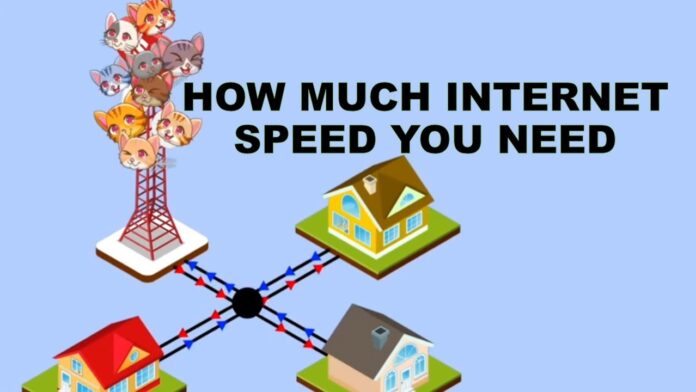Table of Contents
- Understanding Internet Speeds
- Internet Speed vs Bandwidth
- Internet Speed Required For
- Streaming Netflix
- For Streaming Amazon Prime Video
- For DirecTV Stream
- For Live-Streaming Sports
- For Online Gaming
- For Streaming YouTube Videos
In Conclusion
We use the internet for a lot of our everyday activities that also include entertainment and communication. From streaming YouTube vlogs to holding video conferences, we need more than minimum internet speeds to meet our needs. Here is a quick guide on what internet speeds are needed for different streaming purposes.
Understanding Internet Speeds
Users require understanding about what their internet speed is and how it works. Internet speeds decide what activities you can perform, therefore, it’s crucial to choose a plan accordingly.
The simplest explanation of internet speeds is that it’s the speed with which your data is transferred from one point to another.
You will see that internet speeds are defined by “Mbps”, which stand for Megabits per second. Basically, the internet is identified in bits per second. However, bits are the smallest unit in terms of computer data, which is why internet speeds are identified as “Megabits”.
There are two types of internet speeds:
- Download speed is the rate at which data is received from external sources.
- Upload speed is the rate at which data is sent and transferred to external sources.
Another important terminology used in reference to internet speeds is “latency”. It is defined as the time it takes or the delays in data transfer. This means that the time taken for data to travel between the sender and the destination is referred to as latency. It varies from one internet type to another. Fiber-optic internet tends to have the least latency. Meanwhile, satellite internet is one of the internet types with the highest latency.
Internet Speed vs Bandwidth
While internet speed refers to the time it takes for data to travel over the web, bandwidth has a different definition. Bandwidth is the amount of data that can be transferred over the web. It does not have to do anything with the speed of the transfer. As the bandwidth increases, so does the capacity or amount of data. Ideally, bandwidth is used to demonstrate the number of devices that can be connected to the internet. When more devices are connected, more bandwidth is consumed. This means that the speed is not as essentially affected as the bandwidth is, and double or twice the amount of data is traveling over the web at a time.
Internet Speed Required For
Streaming Netflix
Streaming OTT platforms like Netflix have speed requirements based on the resolution of the video you are watching.
- 3 Mbps for streaming in SD
- 5 Mbps for streaming in HD
- 25 Mbps for streaming in UHD/4K
For Streaming Amazon Prime Video
Like Netflix, Prime Video also has different speed requirements for different resolutions.
- 1 to 2 Mbps for SD streaming
- 3 to 5 Mbps for HD streaming
- 15 Mbps or more for 4K streaming
For DirecTV Stream
DirecTV Stream lets you watch live TV and on-demand from a wide variety of content on the go. The recommended internet speeds for DirecTV Stream are;
- 8 Mbps for one stream (high resolution)
- 100 Mbps or more for 10+ streams
- 2.5 Mbps of mobile/cellular internet for one stream (SD)
Unlike other streaming services, the best part about DirecTV Stream so that you can get high-speed internet packages bundled up with it. AT&T Fiber is the best choice to make to ensure smooth HD streaming. You can easily subscribe to a suitable package by calling DirecTV customer service at any time.
For Live-Streaming Sports
If you are a sports lover, you will find yourself streaming live sports on multiple occasions. Whether you are streaming on a website, a mobile app, or are streaming live with DirecTV stream, you need a stable internet connection.
The internet speed needed for streaming live sports mainly depends on the resolution you are streaming in. However, the number of devices connected and the requirements of the website also affect the speed criteria. Roughly, this is how different resolutions require internet speed for live-streaming:
- 480p requires 3 Mbps
- 720p requires 5 Mbps
- 1080p requires 5 Mbps or more
- 4K requires 25 Mbps or more
For Online Gaming
Online gaming is almost impossible if you do not have sufficient internet speed and bandwidth. You can’t make do with high latency, as any delays in the game will adversely affect your performance as the gamer. Not only this, but if you are playing a multiplayer game, then you need high-speed internet that lets you keep up with your teammates in real-time.
FCC specifies in its broadband speed guide that a minimum of 1-2 Mbps is required for online gaming. However, this is only applicable when there is only 1 device connected. For when there are multiple devices connected to the internet, the speed requirements change.
For online gaming, you should rather go for an internet type with low latency, which fiber-optic excels in. The resolution of the game is also a determining factor here.
Here is an overview of speed requirements for online gaming:
- 1-2 Mbps for basic online gaming (single users)
- 3 Mbps for game consoles
- 6 Mbps or more for multiple users
- 10 Mbps or more for HD gaming (multiple users)
- More than 100 Mbps for 4K and multi-player games (multiple users)
In Conclusion
If you have sufficient internet speed, bandwidth, and latency, then you can stream like a pro. Whether you are streaming an online game or running a movie marathon on Netflix, decent internet speeds are a must-have. Make sure you have considered factors like the number of users, devices, and internet types before signing up for any internet plan.
































